MercoPress. South Atlantic News Agency
Politics
-
Friday, October 11th 2013 - 07:49 UTC
Rare praise for Argentina’s economy performance from the World Bank
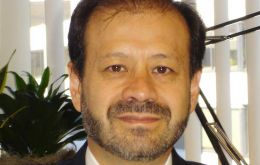
Argentina will grow at an enviable rate compared to other countries in the region, Chief Economist for the World Bank’s Latin America and Caribbean Office Augusto de la Torre said this week, commenting on the institution’s projections for next year.
-
Friday, October 11th 2013 - 07:21 UTC
World Bank/Argentina agree on new Strategic partnership: 3bn dollars in loans
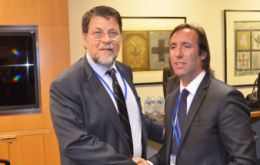
The Argentine government and the World Bank agreed on Thursday in Washington on a new Strategic Partnership involving an estimated 3 billion dollars in the next three years which will concentrate on loans for education, health care and rural development.
-
Thursday, October 10th 2013 - 05:24 UTC
Government is run by a solid team following Cristina Fernandez instructions’

Argentine Cabinet Chief Juan Manuel Abal Medina guaranteed there will be no political or institutional crisis due to President Cristina Fernández health condition and underlined that ‘the president’s team is solid and working with no difficulty”, following her instructions.
-
Thursday, October 10th 2013 - 05:21 UTC
Pope Francis sends his blessings to President Cristina Fernandez
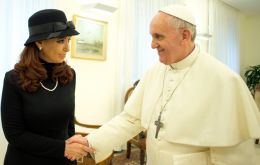
Pope Francis has wished President Cristina Fernández a “full health recovery” following the surgery she underwent on Monday at the Fundación Favaloro clinic in Buenos Aires. “I beg you to feel my presence. I guarantee my nearness and prayer,” the ex Argentine cardinal said.
-
Thursday, October 10th 2013 - 02:34 UTC
Venezuela insists in re-establishing full relations with Paraguay, but legal obstacles remain

Venezuela and Paraguay need to re-establish full relations and overcome “all the obstacles that need to be overcome”, said Foreign minister Elías Jaua currently in Asunción, a special guest of his counterpart Eladio Loizaga.
-
Thursday, October 10th 2013 - 01:25 UTC
Ice patrol HMS Endurance a complete loss, will be scrapped says MOD

The Royal Navy's former ice patrol ship HMS Endurance is to be scrapped after the Ministry of Defense decided the cost of repairing the vessel, which flooded off the coast of Chile in 2008, was too great.
-
Thursday, October 10th 2013 - 01:11 UTC
New editors for leading Cuban newspapers: “too much triumphalism and too apologetic”
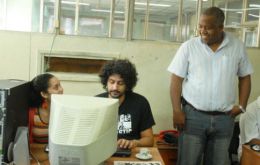
Cuba has appointed new editors for the country's two main newspapers - Granma and Juventud Rebelde. The shake up in the island's tightly controlled media was described by the Communist Party as a “renewal”.
-
Thursday, October 10th 2013 - 01:01 UTC
As Cristina Fernandez evolves favourably, debate targets acting-president Boudou

While Argentine presidential spokesman Alfredo Scoccimarro confirmed that President Cristina Fernández “evolves favourably” and is “in good spirits”, the political debate on Wednesday has centred on Vice-president and acting president Amado Boudou whom the opposition argue should not lead the country given his questionable credentials and mounting legal problems
-
Thursday, October 10th 2013 - 00:48 UTC
Brazil wants to catch the spies and will host global summit on Internet governance next April
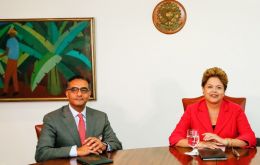
Brazil, which has slammed massive US electronic spying on its territory, said on Wednesday it would host a global summit on Internet governance in April. President Dilma Rousseff made the announcement after conferring in Brasilia with Fadi Chehade, chief executive of the Internet Corporation for Assigned Names and Numbers (ICANN).
-
Thursday, October 10th 2013 - 00:35 UTC
Obama nominates ‘pro-jobs’ Yellen to head the Federal Reserve

President Barack Obama has nominated Federal Reserve Vice-Chair Janet Yellen to run the world's most influential central bank and urged the Senate to confirm her without delay. Yellen, an advocate for aggressive action to stimulate US economic growth through low interest rates and large-scale bond purchases, would replace Fed Chairman Ben Bernanke, whose second term ends on January 31.
